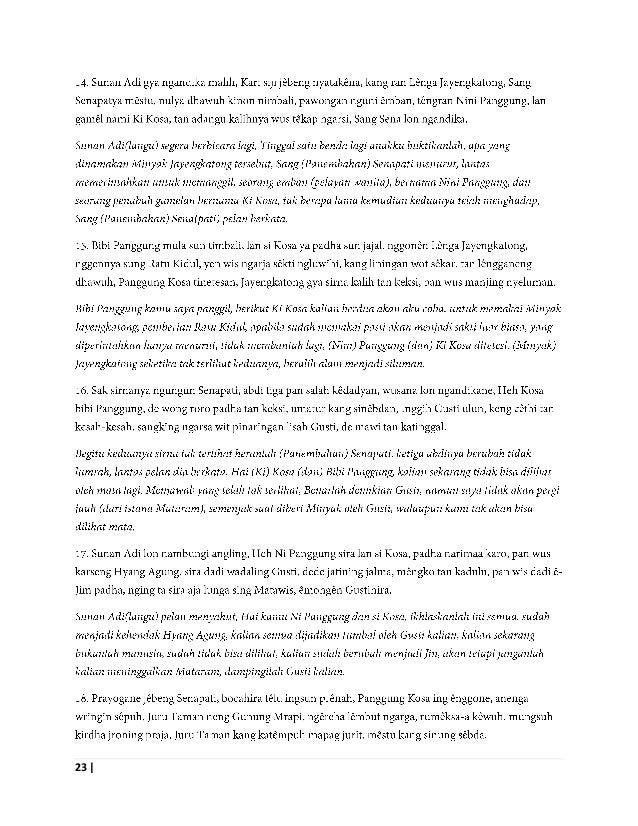
Babad Tanah Jawa Pdf
Babad Tanah Jawi merupakan karya sastra sejarah dalam berbentuk tembang Jawa. Sebagai babad/babon/buku besar dengan pusat kerajaan zaman Mataram, buku ini tidak pernah lepas dalam setiap kajian mengenai hal hal yang terjadi di tanah Jawa.
Willem eprom pcb50 software download. Author by: Anton Suparnjo Dipomenggolo Language: jw Publisher by: Diandra Kreatif Format Available: PDF, ePub, Mobi Total Read: 99 Total Download: 959 File Size: 51,9 Mb Description: Buku ini merupakan versi Pesisiran dari Babad Tanah Jawi, Kitab Induk sejarah raja-raja Jawa. Penulis anonim. Merupakan Alih Aksara dari tulisan asli Jawa Carik (tulisan tangan) dan berbahasa Jawa, serta Alih Bahasa ke Bahasa Indonesia. Karya ini adalah karya tulis anak bangsa masa lalu yang terdokumentasi dan terbaca oleh generasi masa kini.
Buku ini belum pernah dikaji secara ilmiah filologis, menunggu para pengkaji budaya Jawa menindaklanjuti dengan pengkajian yang lebih mendalam dan rinci. Buku ini cenderung merupakan versi subvertif dari Babad Tanah Jawi yang ditulis oleh para pujangga kraton. Author by: Nancy K.
Florida Language: en Publisher by: Duke University Press Format Available: PDF, ePub, Mobi Total Read: 63 Total Download: 733 File Size: 51,9 Mb Description: Located at the juncture of literature, history, and anthropology, Writing the Past, Inscribing the Future charts a strategy of how one might read a traditional text of non-Western historical literature in order to generate, with it, an opening for the future. This book does so by taking seriously a haunting work of historical prophecy inscribed in the nineteenth century by a royal Javanese exile—working through this writing of a colonized past to suggest the reconfiguration of the postcolonial future that this history itself apparently intends. After introducing the colonial and postcolonial orientalist projects that would fix the meaning of traditional writing in Java, Nancy K. Florida provides a nuanced translation of this particular traditional history, a history composed in poetry as the dream of a mysterious exile. She then undertakes a richly textured reading of the poem that discloses how it manages to escape the fixing of 'tradition.'
Adopting a dialogic strategy of reading, Florida writes to extend—as the work’s Javanese author demands—this history’s prophetic potential into a more global register. Babad Jaka Tingkir, the historical prophecy that Writing the Past, Inscribing the Future translates and reads, is uniquely suited for such a study. Composing an engaging history of the emergence of Islamic power in central Java around the turn of the sixteenth century, Babad Jaka Tingkir was written from the vantage of colonial exile to contest the more dominant dynastic historical traditions of nineteenth-century court literature. Florida reveals how this history’s episodic form and focus on characters at the margins of the social order work to disrupt the genealogical claims of conventional royal historiography—thus prophetically to open the possibility of an alternative future. Author by: Nancy K. Florida Language: en Publisher by: Cornell University Press Format Available: PDF, ePub, Mobi Total Read: 53 Total Download: 981 File Size: 50,6 Mb Description: This book completes a series of three volumes cataloguing the Javanese-language manuscripts housed in four repositories in the Central Javanese city of Surakarta that were preserved in microfilm under the auspices of the Cornell University's Surakarta Manuscript Project. The present volume describes the manuscripts of the Radya Pustaka Museum and the private library of the late Panembahan Hardjonagoro, a body of materials that date from the early eighteenth to the early twentieth century.
Detailing the contents of the 1,204 texts inscribed in these 478 manuscripts, Nancy K. Florida's fully-indexed catalogue guides the reader through a wide range of materials. The manuscripts catalogued include autobiographical writings; gamelan notation; works of calendrical divination; annotated translations of the Qur’an; compendia of colonial laws and regulations; Sufi poetry; royal genealogies; handbooks on horsemanship; histories of legendary heroes; and scripts for wayang performances.